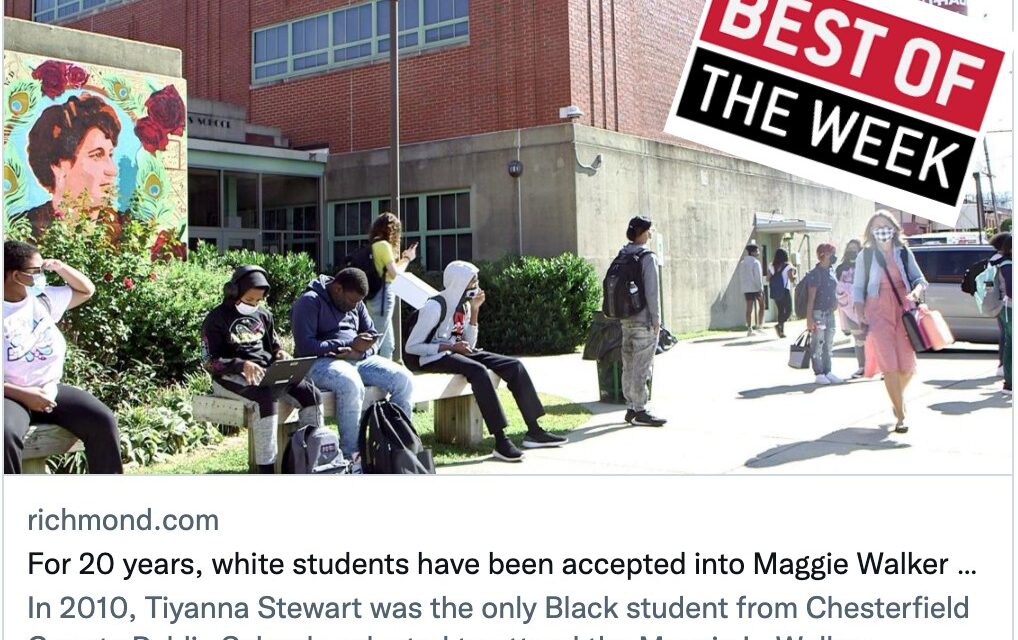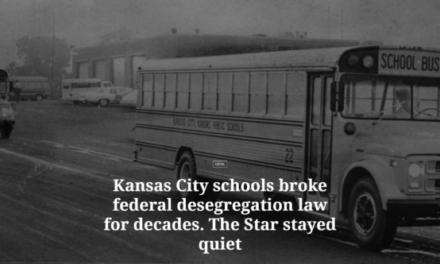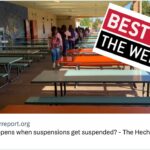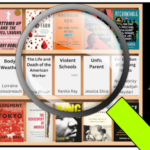|
Despite logistical challenges, safety concerns, and political conflicts, most schools are making in-person schooling work. Closings are down. Quarantines are being streamlined. Schools are figuring out how to get kids in the classroom — and keep them there. There haven’t been as many of these stories as I’d like to see, but the trend is emerging:
🔊 With Masks On or Off, Schools Try to Find the New Normal (NYT)
🔊 Across America, students are back in school. It’s working — but it’s weird. (Washington Post)
🔊 The National Guard is easing school bus struggles, districts say. So are new Spanish-language driver tests (WBUR)
🔊 Dept. Of Education Office Workers Sent To Understaffed NYC Schools (Gothamist)
🔊 Music classes are back in school this year, finally indoors and off Zoom (NPR)
🔊 Band Class And Chorus Are Back — They Just Look A Bit Different (GBH)
🔊 COVID Cases Among Children Are Declining. Has the Back-to-School Surge Peaked? (Education Week)
Also: National test scores from before the pandemic showed declines in scores and a deepening divide between the top scorers and the lowest scorers. See The 74, U.S. News, Washington Post, Chalkbeat, Education Week, and Politico.
Did someone forward you this newsletter? You can sign up here.

|
INEQUALITY AT A SELECTIVE HIGH SCHOOL
Best education journalism of the week.
|
|
| 🏆 BEST: The best story of the week is For 20 years, white students have been accepted into Maggie Walker at a rate nearly four times higher than Black students by Kenya Hunter in the Richmond Times-Dispatch. The story focuses on the stunning lack of diversity at a highly selective formerly all-Black high school named after a Black civil rights trailblazer. To get this story, Hunter doggedly pursued admissions data showing that the acceptance rate for Black students was nearly four times lower than the rate for white students. The number of Hispanic students admitted was even lower. Through student interviews, she also painted a humanizing portrait of how this lack of diversity and double standards for admission has affected them. The story — part of a three-part series — received praise from other star education reporters, including the New York Times’ Erica Green and ProPublica’s Aliyya Swaby.
🏆 RUNNER-UP: This week’s runner-up is When Fourth-Graders Can’t Read: One Phoenix School Has a New Way to Fight Pandemic Learning Loss by Yoree Koh in the Wall Street Journal. Koh reports on a school in Arizona where kids were already routinely behind in literacy skills before the pandemic. But the situation reached a crisis level once schools shut down, with nearly half of one fourth-grade class reading at a kindergarten to first-grade level. To address this situation — not unique to this school — the school in Phoenix has added a literacy component to every subject, even physical education. This story spotlights a critical issue for schools across the country and a unique solution to help solve it.
BONUS STORIES:
🏆 Black Lives Matter, She Wrote. Then ‘Everything Just Imploded.’ (NYT)
🏆 The Kids the Pandemic Left Behind (Mother Jones)
🏆 Black Children Were Jailed for a Crime That Doesn’t Exist (ProPublica/Nashville Public Radio)
🏆 Texas struggled to teach students learning English before COVID-19. The pandemic made it worse. (Texas Tribune)
🏆 Baltimore City student laptops are monitored for mentions of suicide. Sometimes, the police are called. (Baltimore Sun)
🏆 Gaggle Surveils Millions of Kids in the Name of Safety. Targeted Families Argue it’s ‘Not That Smart’ (The 74)

THE PARENT QUESTION
New from The Grade |
|
|
Education reporters regularly get asked whether or not they are parents. Sometimes, the question seems motivated by curiosity. Other times, the question seems like more of a challenge.
In this new first-person essay, AL.com education lab editor Ruth Serven Smith describes what it’s like to be asked that question and how she handles it. She notes that any answer puts a reporter — especially a female reporter — in a double bind. That’s part of why she’s inclined not to answer in the future. “I think most reasons for asking and answering are too intertwined with problematic ways we treat women, parents, and children in society.”
Also: For five years, the education nonprofit Chalkbeat received funding from the Emerson Collective, headed by Laurene Powell Jobs. But did Chalkbeat’s funding stop because of Chalkbeat’s critical coverage? It’s plausible. But that doesn’t make it true. The evidence is extremely thin. The timeline is a bit off. And there are lots of other equally plausible explanations.
Coming soon: Unpacking the “scarcity” narrative in education journalism, rethinking how math instruction gets covered, and what parent-focused education journalism looks like.

MEDIA TIDBITS
Thought-provoking commentary on the latest coverage. |
|
| Above: How negative is U.S. education coverage? Very. But there are big variations. “USA Today, at 72% negative, was by far the most negative,” according to Cafeteria Duty’s look back at September education headlines. “Hechinger, at 33%, was the most positive.”
📰 NEGATIVE NEWS COVERAGE ALIENATES & MISLEADS: “The coverage of schools simply does not comport with my own experience,” writes the anonymous educator and newsletter writer known as Cafeteria Duty. He’s not alone in making this observation. Nonprofit founder Emily Freitag describes how depressing news coverage is these days. “Much of it is justified, but it’s also overly negative,” notes the Fordham Institute introduction. “This can cause us to lose sight of the progress we’ve made, and risks draining the optimism needed to progress further.”
📰 RETHINKING SCHOOL BOARD PROTEST COVERAGE: Why do school board protest stories get such enormous attention? The visuals and intensity, of course, along with the racial and political undercurrents. They’re a no-brainer to assign and easy to cover. But they’re also extremely hard to cover in a way that’s helpful and informative to audiences. There’s got to be a way to cover them that doesn’t create the impression the protests are ubiquitous — or reward outbursts and theatrics. I just don’t know what it is. How much conflict do we really have right now, out of the nation’s 14,000 school boards? Where are the school boards that have addressed serious differences in constructive ways? And how do you tease out legitimate school board protests from those whose claims lack substance or whose goals are simply to create conflict and generate media attention? I have questions but no immediate answers. Please help.
📰 STUDENT VOICES IN SOUTHLAKE: Speaking of school board protests, the six-part Southlake podcast from NBC grew out of a digital story and a broadcast piece and centers student voices. “Our email inboxes were filling up with messages from parents in suburban towns across the country, who wanted us to know that the backlash in Southlake was happening in their towns, too,” said NBC’s Mike Hixenbaugh. So NBC decided to turn it into a podcast. This llowed the reporters to include voices that aren’t always featured in regular news coverage, like student voices. According to co-host Antonia Hylton, the student interviews as an enormous challenge — and opportunity. “Without a doubt, those are the moments that have elicited the most surprise, emotion, and response from our audience.” So maybe that’s one good place to start.
📰 IDEAS TO STEAL: Here are three good ideas to consider using in your own journalism: (1) Consider L.A. Times health reporter Marissa Evans’ idea that journalists “ask if an interviewee has ever been interviewed before to make sure they understand the process.” (Chalkbeat’s Susan Gonzalez says she asks sources “do you have any questions for me or about how the reporting/publishing process works?” (2) Note how the New York Times’ recent story headlined Many Fear Being Left Behind as Democrats Trim Spending Bill centers on the people whose lives are directly affected, rather than the political back and forth and speculation about who’s going to “win.” (3) Grab the data assembled by the Solutions Journalism Network showing that, while police involvement in schools is a major problem, 146 schools in 35 states reported significant declines in police involvement. Are they juking the stats, or have they done something to change the school climate?
Looking for media commentary and analysis all day, every day? Follow me at @alexanderrusso.

|
PEOPLE, JOBS, KUDOS
Who’s going where & doing what?
|
|
|
Above: Kyle Pfannenstiel, a Report for America fellow who’s reported on COVID in Idaho, was hired as the K-12 education reporter at Idaho Education News. And WLRN education reporter Jessica Bakeman has been promoted to senior editor for news. Congrats to both!
🔥 Kudos: Former WSJ education reporter Tawnell Hobbs’ latest investigation (with Andrea Fuller) reveals how high-tuition private universities like Baylor encourage parents to take on massive debts they couldn’t afford. Jo Napolitano penned her first story as a staffer for The 74 on undocumented kids in U.S. schools. Her colleague Asher Lehrer-Small described it as “deeply reported, informative, and human.” And big congrats to NPR’s Anya Kamenetz, who turned in the first draft of her new book, “The Stolen Year.”
🔥 Impact: Just days after Meribah Knight and Ken Armstrong published their WPLN/ProPublica investigation into Black children being arrested at school and jailed for a nonexistent crime, Middle Tennessee State University cut ties with a judge implicated in the story. And on Capitol Hill, 19 members of Congress cited coverage from The 74 in asking the U.S. Treasury to allow school districts to distribute rental assistance funds to families at risk of eviction. (H/t Linda Jacobson.)
🔥 Jobs! WLRN, South Florida’s NPR member station, is looking for a Miami-based education reporter. The Morning Call in Allentown is hiring a general assignment education reporter. The Virginian Pilot and Daily Press are hiring an education reporter after Sara Gregory left for the new Post and Courier Ed Lab. The Minneapolis Star-Tribune is hiring a metro reporter to cover statewide K-12 education.The Atlanta Journal Constitution is hiring an education reporter. The Seattle Times Ed Lab is hiring a reporter. WBUR, Boston’s public radio, is hiring a new education editor. Any new job opening out there that folks might want to know about? Let us know.
🔥 It used to be that freelancing was what you did when you couldn’t get a full-time staff job. But these days more and more education journalists are leaving full-time jobs to go out on their own, or staying freelance even when staff jobs are available. Why? How? Any advice to share? Tell us everything at thegrade2015@gmail.com or DM us at @thegrade_.

|
APPEARANCES, EVENTS
What just happened & what’s coming next?
|
|
| Above: Don’t miss today’s panel on journalism as a tool for impact at the Grantmakers for Education 2021 Annual Conference, featuring the Dallas Morning News’ Tom Huang and The 74’s Jim Roberts.
⏰ Upcoming: WBUR education reporter Carrie Jung will moderate a discussion on Oct. 25 with WBUR CitySpace about how educators and students are changing their approach to learning in the pandemic.
⏰ Media appearances: The New York Times’ Erica Green was on the Elevate Maryland Podcast on amplifying Black women. Also, catch GBH education reporter Meg Woolhouse on WBUR’s Consider This talking about her story on Boston schools desegregation — then and now.
⏰ Looking for a fellowship? The O’Brien Fellowship, focused on exposing injustices and inspiring change, is hosting a Q&A session on Nov. 3. Register here. One of its most recent recipients is former Boston Globe education editor Sarah Carr. Also, you have two more days to apply for a fellowship to help cover the cost of attending IRE’s online DBEI Symposium Oct. 21-22.
⏰ Weekly resources: Check out the latest numbers from Burbio on full-time in-person instruction, which is trending upwards. And take a look at CRPE’s school reopening database for more data. Any other regularly updated resources journalists could use? Let us know.
Did someone forward you this newsletter? You can sign up here. |
|
|
|
|
|
|
|
|
|
|




















